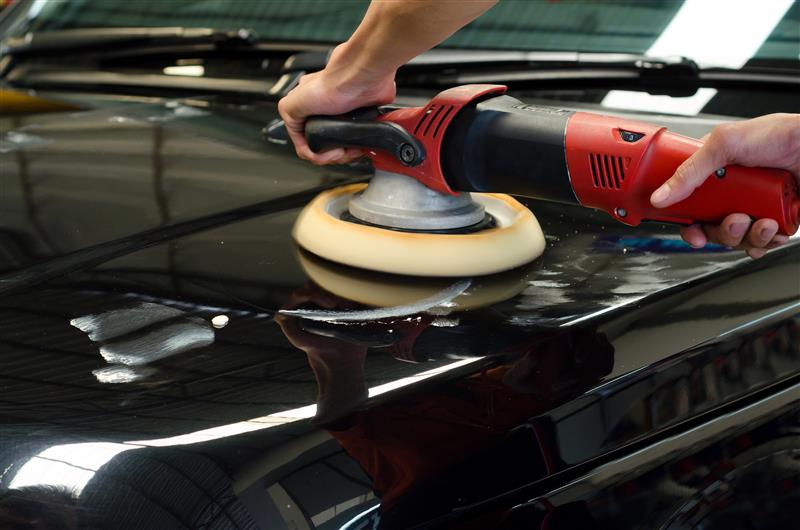
Black cars look sharp when they’re clean, but they don’t hide anything. Even the slightest scratch or swirl tends to stand out, making the finish look dull or worn. The good news is that you can remove or reduce many light to moderate scratches with the right approach.
This guide covers what causes those marks, how to assess the damage, and the best methods to bring back a smooth, polished shine.
What Kind of Scratch Are You Dealing With?
Before you can fix a scratch, you need to know how deep it goes. Car paint contains several layers:
● Clear coat – the top layer that protects the finish
● Base coat – the color layer
● Primer – a base that helps paint stick to the surface
● Metal body – the panel beneath it all
The good news: most scratches are in the clear coat and can be polished away. If a scratch goes deeper into the base coat or primer, it might take touch-up paint or a professional repair, but those cases are less common.
How to Tell How Deep the Scratch Is
Use this quick test to assess the scratch before you try to fix it.
Run your fingernail gently across the scratch:
● If it doesn’t catch, you’re likely dealing with a surface-level mark in the clear coat. This type of scratch can often be polished out by hand.
● If it catches, the scratch likely goes deeper into the base coat or primer. Skip polishing and look into touch-up paint or professional repair.
You're ready to start the fix once you know what you’re working with.
Step 1 – Wash and Dry the Car
Start with a clean surface. Dirt or grit can worsen scratches if dragged across the paint.
Use:
● A pH-balanced car shampoo
● Microfiber wash mitts to reduce surface friction
● Plush microfiber towels for drying (avoid chamois or household towels)
Need a quick refresher on proper technique? Here’s how to wash your car at home the right way.
Make sure the surface is completely dry before moving on to the next step.
Step 2 – Clay Bar Treatment (Recommended)
Even after washing, your paint may still hold onto embedded contaminants that polishing alone won’t remove. A clay bar treatment helps smooth the surface and prep it for correction.
How to use a clay bar:
- Spray clay lubricant over a small section of the paint.
- Glide the clay bar over the surface in straight lines.
- Wipe clean and check by feel—you’re ready to polish if it's smooth.
Want a step-by-step demo? Read about claying and watch a helpful how-to video.
Step 3 – Apply a Scratch Remover or Polishing Compound
This is where real correction begins. For clear coat-level scratches, a mild polishing compound can remove visible defects and restore gloss.
Recommended: Stoner Car Care Polish & Seal
Formulated for dark-colored paint, it removes fine scratches, swirl marks, oxidation, and haze while restoring depth and clarity. Safe for all clear coat finishes.
How to use it by hand:
● Apply a small amount to a foam or microfiber applicator
● Work it in with circular or back-and-forth motions
● Focus on 2x2 ft. sections for even results
● Let it haze, then buff off with a clean microfiber towel
● Repeat as needed using even, moderate pressure
Step 4 – Use a Machine Polisher for Deeper Clarity (Optional)
For better results—especially on moderate swirls or full panels—use a dual-action (DA) polisher with a polishing pad.
Stoner Polish & Seal can be applied by machine for increased effectiveness.
Polishing tips:
● Keep the pad flat against the paint
● Work at low to medium speed
● Avoid hovering in one spot
● Wipe with a clean towel between passes
This polishing step helps create a deeper, glossier finish that makes black paint stand out.
Step 5 – Seal and Protect the Paint
After polishing, seal the surface to help prevent future scratches, oxidation, and swirl marks.
Recommended: Stoner Car Care Speed Bead Quick Detailer
This quick-detailing spray enhances gloss while adding a hydrophobic, UV-resistant barrier.
How to apply:
● Spray lightly onto a clean, cool surface
● Wipe with a clean microfiber towel
● Flip to a dry side and buff to a high-gloss finish
For extended protection, consider applying wax or a ceramic spray every few months.
What to Do About Deeper Scratches
If a scratch goes beyond the clear coat, it may need more than polishing. Here's how to handle it based on severity:
|
Scratch Depth |
Repair Approach |
|---|---|
|
Clear coat only |
✅ Polish or use a scratch remover |
|
Into the base coat |
✅ Touch-up paint with a color-matched pen or kit |
|
Through primer |
✅ Wet sanding (1,500–3,000 grit) followed by polishing |
|
Into metal |
✅ Professional repair to prevent rust and further damage |
❗ Important: Avoid wet sanding if you’re unsure how deep the scratch is. It can easily cut through too much and cause permanent damage.
Tips to Prevent Scratches on a Black Car
Black paint shows everything. These tips help keep it looking sharp:
● Use touchless washes or the two-bucket method: Minimizes contact and grit during washing.
● Dry with plush microfiber towels: Avoid paper towels, bath towels, or terry cloths that may scratch.
● Apply a sealant or spray wax regularly: Use a product like Stoner Speed Bead or a Hybrid Ceramic Detailer every few weeks to protect the finish.
● Avoid automatic car washes: Especially ones with spinning brushes; they’re known for leaving swirl marks.
● Be smart about parking: Steer clear of trees, bushes, and tight spaces where door dings or shopping carts are likely.
Bring Back the Deep, Glossy Finish
Fixing scratches on black paint takes patience, but it's doable with the right tools and technique. You can handle most imperfections at home, from swirl marks to more visible surface damage. Work step by step, use products that are made for the job, and always finish by sealing and protecting the surface.
After a few careful passes, your black paint will look sharp, clean, and polished again. Enjoy the shine, and enjoy the ride!



